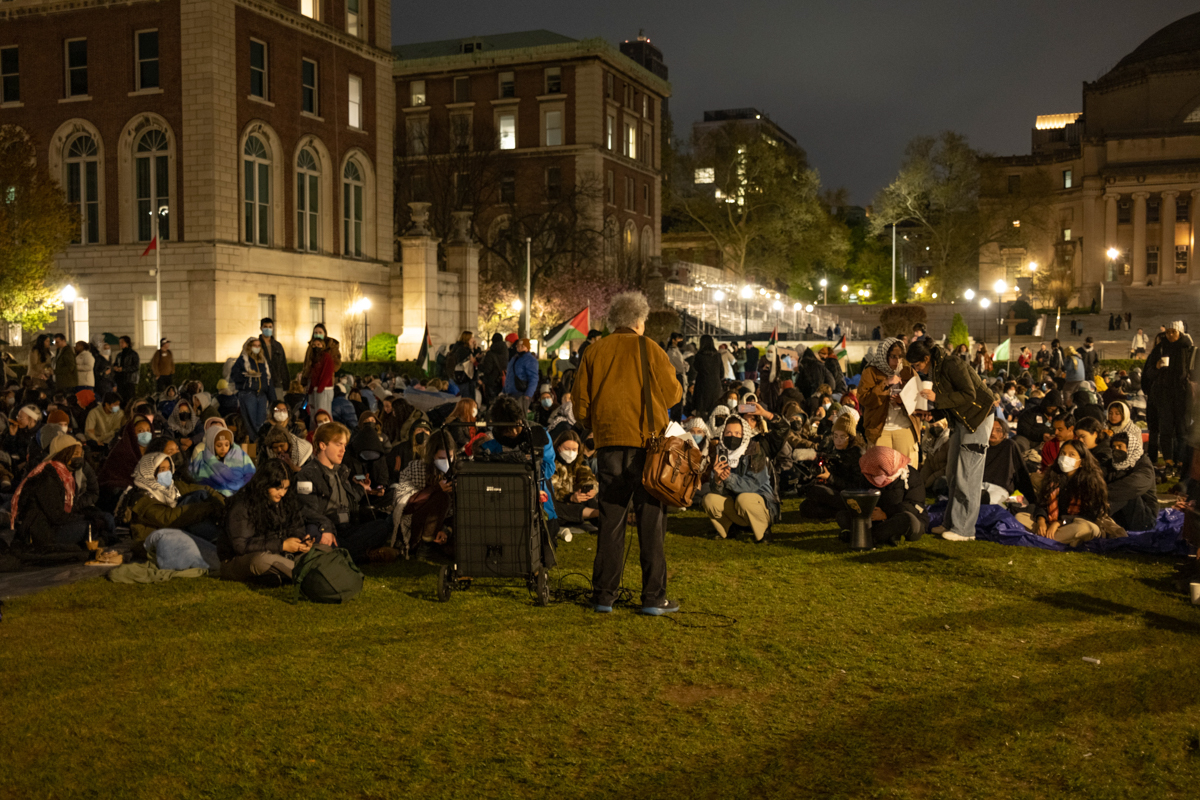Students of Columbia University in the City of New York have staged a wide-scale demonstration on their Harlem campus in protest of the institution’s “continued financial investment in corporations that profit from Israeli apartheid, genocide, and occupation in Palestine”.
A “Gaza Solidarity Encampment”, in which students have camped on Columbia’s South Lawn since 4am last Wednesday, was organised by student activist groups Columbia University Apartheid Divest (CUAD), Students for Justice in Palestine (SJP), and Jewish Voice for Peace (JVP).
Over 100 students were arrested last Thursday afternoon after University President Minouche Shafik authorised the NYPD to sweep the encampment.
The demonstration echoes protests in 1968 against US involvement in the Vietnam War in which students occupied five buildings on campus for a week – what is now seen as a defining moment in the university’s culture.
As of time of publication, students have refused to abandon the encampment, with others supporting them in demonstrations both on and off campus. The protest has garnered national media attention and comment from the White House.
Organisers insist upon “complete transparency for all of Columbia’s financial investments”, and “demand full amnesty, no further arrests, and the dropping of all charges” for students protesting against their university’s ties to Israel.
Alongside stocks and bonds in Israeli companies making up a portion of their endowment, Columbia’s ties to Israel include a Global Center in Tel Aviv, as well as a dual degree programme with Tel Aviv University, in a similar vein to the programme with Trinity.
Trinity students on the dual BA programme, now in their final two years of study in Columbia, as well as Trinity students on international exchange, have been active in and alongside the ongoing encampment.
A student within the encampment described the mood in the “always good, even in the rain and the cold”, and continued by saying that “there are a few Irish students in the encampment – enough so that an Irish Times reporter came specifically to speak to them”.
She added that some security guards “support [them] by bringing food, and letting [them] through gates with noticeable supplies”, although now the administration is “closing exits with little warning, and not letting press through”.
A third year dual BA student said that although he and a large majority of Columbia students haven’t taken part in the encampment or any similar protest this year, “generally, support for the encampment is pretty high”.
“There’s widespread support for people to peacefully express their beliefs and dismay at the university’s policy” towards the protestors.
“General opinion on Columbia’s response to the encampment is overwhelmingly negative. I have yet to speak to someone who agrees with Columbia President Minouche Shafik’s decision to suspend, or allow the arrest of, those participating in the encampment.”
Although “the encampment has affected life very little at Columbia”, he says “the university’s response to it has”. After the mass arrest of students related to the encampment and corresponding protests, “campus is immensely different. It’s far more empty than I’ve ever seen it […] classes are being cancelled or moved online”.
Students who are in the US on a student visa were advised not to enter the encampment for the risk of arrest and suspension, and therefore the possibility of deportation, is high.
Other dual BA students directly involved in the encampment and corresponding protests have decided not to talk to Trinity News, due to concerns for their safety and after the advice of protest organisers.
The arrested student protestors have since been released from custody, with only two people being charged with “obstructing governmental administration and trespassing”. NYPD and the Anti-Terrorism Unit have remained present on campus since Thursday.
Organisers of the encampment further state that a student fainted outside the protest, and that “police denied access to health services”. At least three students from Barnard College, an affiliate institution of Columbia, have also been “placed on interim suspension” for their involvement.
The encampment began the same morning that Columbia University President Minouche Shafik testified before a US congressional hearing regarding anti-semitism on American college campuses.
Similar hearings in December of last year culminated in the eventual resignations of Harvard President Claudine Gay, and University of Pennsylvania President Elizabeth McGill, after accusations of indifference to anti-semitism gained traction.
Organisers of the encampment have vowed to stay on campus “everyday until divestment” from Israeli institutions has been achieved.
The protests have been countered by a notable presence of pro-Israeli protestors. With instances of anti-semitism against Jewish students opposing the encampment ongoing, a high profile New York Rabbi has advised Jewish students to “return home as soon as possible”.
Trinity College Dublin has been contacted for comment.






